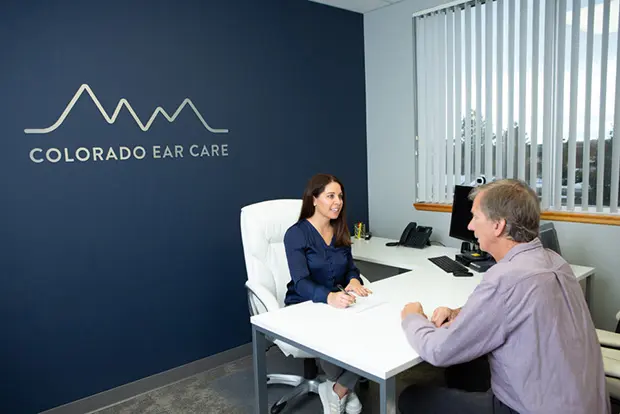Hearing care is more than just ear protection and regular hearing tests
While wearing ear protection in noisy environments and getting annual hearing tests starting at age 60 are both crucial to hearing health, many of our patients are surprised to learn that making healthy choices can also have a significant impact on hearing health, too.
It should come as no surprise to anyone that our bodies are very connected, and prioritizing our holistic health can affect specific parts of the body in different ways. For example, exercising can help us maintain a healthy weight, but it can also help in managing and preventing heart disease.
The same rules apply to hearing health.
Three ways you can care for your hearing health through overall bodily health
Although hearing loss is irreversible, it is highly treatable thanks to modern hearing aid technology, and there are additional steps everyone can take to slow the progression of hearing loss (in addition to regular hearing tests and wearing hearing protection, of course!). Leading a healthy, well-balanced life is important in general, but here are three specific ways you can care for your hearing health by prioritizing your physical health.
1. Eat a healthy, well-balanced diet
While there’s no silver bullet food or type of diet that will completely prevent hearing loss, there are some foods you can add to your diet that can positively impact your hearing health.
For example, foods that are high in magnesium and omega-3 fatty acids can provide some of the nutrients that are essential for healthy hearing. Magnesium is helpful for blood flow and nerve function — two essential parts of how our ears capture and process sound for our brains — and omega-3s have anti-inflammatory properties that can help your inner ear function more effectively.
To maximize the hearing health benefits of your diet, look for foods that are natural sources of key vitamins and nutrients, especially potassium, folate, and zinc, which all play key roles in how well your ears function.
Here are just a few of the foods you can add to your diet to support healthy hearing:
- Salmon (high in magnesium and omega-3 fatty acids)
- Bananas (high in potassium and folate)
- Spinach (contains zinc and other nutrients)
- Flax Seeds (a good source of magnesium and omega-3s)
2. Stay physically active
Although the link between physical activity and hearing health may not be obvious, proper blood circulation plays a key role in hearing, and exercise is the best way to improve it.
When blood circulation is restricted through cholesterol buildup, high blood pressure, stress, or other reasons, your inner ears likely aren’t getting enough oxygen and essential nutrients to keep them functioning how they should. Exercise increases blood circulation and oxygen within the blood, so by exercising regularly, you’re ensuring that your ears can get the essential nutrients they need to hear the world around you.
Secondarily, poor circulation from lack of exercise can increase your chances of having dizzy spells or even an accidental fall. Your inner ears play a unique role in balance and dizziness, and when they don’t get enough oxygen, they have a harder time regulating your balance. So, by exercising, you can potentially lessen your risk of falling and make dizzy spells less frequent.
3. Watch out for ototoxic medications
Ototoxic means having a toxic effect on the ear or its nerve supply, and there are several fairly common medications that can negatively impact the inner ear and, therefore, your hearing. In fact, there are more than 600 medications known to trigger tinnitus or lead to quicker development of hearing loss.
While some medications are necessary to treat specific health conditions, and you should never stop taking a medication that’s been prescribed by your doctor, there may be an alternative medication you can take that doesn’t have the same ototoxic side effects, so it’s important to ask your doctor before taking a new medication if there are potentially ototoxic effects.
Some examples of common ototoxic medications include antibiotics, anti-anxiety medication, and blood pressure medication. If you notice any symptoms specific to ototoxic drugs, like poor balance, the feeling of fullness in your ears, or difficulty walking, check with your doctor to see if there’s an alternative you can take, especially if you already experience hearing loss or if hearing loss runs in your family.
Stopping an ototoxic medication can often stop the negative side effects, but, depending on how long you’ve been taking the medication, the effects may become irreversible, so early intervention and identification are key.
–
Always treat your hearing health as you treat your overall health
Since hearing loss can develop gradually and can be hard to detect, preventative measures are the best way to care for your hearing health. In the same way you see your primary care physician annually for an exam and maybe some proactive testing, you should see a hearing care provider annually, as well. Hearing tests can detect even mild levels of hearing loss, making it easier to intervene before it gets too severe.
A healthy diet, exercise, and avoiding ototoxic medications are three great ways to slow the development of hearing loss, but they won’t completely prevent hearing loss alone. If you or a loved one is experiencing hearing loss, early intervention is the key to lessening the impact hearing loss can have on your life. Contact the team at Colorado Ear Care for a hearing test and to discuss your treatment options.

